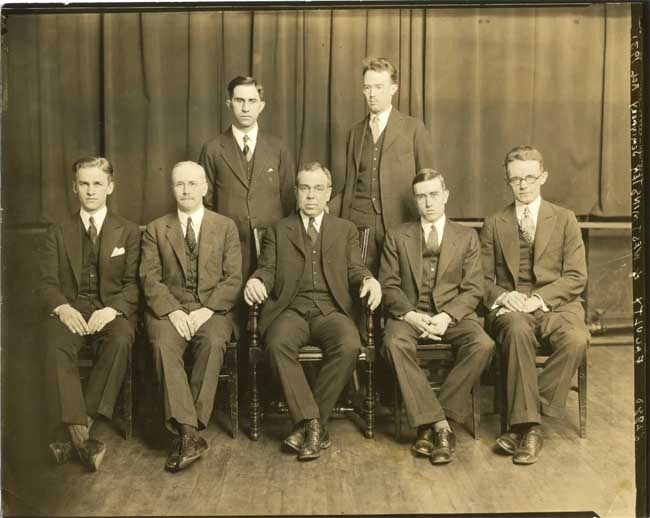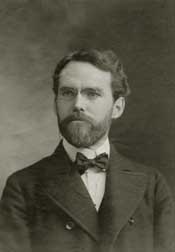The Archives Helps Us Date a Photo.
by Wayne Sparkman
Here at the PCA Historical Center, I recently came across a letter among the correspondence of Dr. Allan A. MacRae, a letter which helps to explain a photograph well-known now in American Reformed circles. That’s Dr. MacRae in the back row of the photo below, on the viewer’s right and standing next to Professor John Murray, and in a letter to his parents dated February 28, 1931, MacRae makes this interesting comment:
“This morning a picture of our faculty was taken. We went to the photographer’s studio where they turned terrifically powerful lights on. I could not stand the glare on my eyes at all. Professor Murray said he would not go through such an experience again for one hundred dollars. I do not see the sense of such a method in taking pictures, for I feel sure that the strained effect that will be produced on every countenance will altogether destroy the value of the pictures. If the proofs are at all good I will be surprised.”
To our knowledge, there is no other photo of the Westminster Seminary faculty from that era and so I have to assume the quote is accurately paired with the photo shown below.
Westminster apparently first posted the above photo to the Internet as a publicity item, about 2002. The photo had previously been used on the cover of a Westminster Media catalog. But what may particularly have made this faculty photo famous was the improvement made to the photo not too many years ago. Justin Taylor, who was then in the employ of The Gospel Coalition, read of the work of a digital artist by the name of Marina Amaral. In a blog post, Taylor wrote:
Amaral is a 22-year-old Brazilian artist whose digital colourisations of iconic black-and-white images have become an internet sensation. Her work breathes new life into old pictures, stripping away the years and giving them an astonishing immediacy. . . .
Amaral, who lives in the city of Belo Horizonte, taught herself how to use Photoshop when she was 12 by watching tutorials on YouTube and experimenting.
For years it was simply a hobby, but in 2015 she came across some colourised photographs of the Second World War on the internet and felt she could create something similar.She has now completed more than 300 pictures, including private work such as old wedding photographs and family portraits, and has left college, where she was studying international relations, to devote herself full-time to her work.
You can see samples of her work here.
Taylor enlisted Amaral to colorize the faculty photo and she did a great job! But it seems that whether you colorize the photo or leave it in its original sepia tone, what remains are the strained expressions on their faces, now explained in Dr. MacRae’s letter:
“This morning a picture of our faculty was taken. We went to the photographer’s studio where they turned terrifically powerful lights on. I could not stand the glare on my eyes at all. Professor Murray said he would not go through such an experience again for one hundred dollars. I do not see the sense of such a method in taking pictures, for I feel sure that the strained effect that will be produced on every countenance will altogether destroy the value of the pictures. If the proofs are at all good I will be surprised.”
And as you look at the photo, I have to think Dr. Machen held up best!
Pictured, left to right in the front row, are:
Ned B. Stonehouse; Oswald T. Allis; J. Gresham Machen; Paul Woolley; and Cornelius Van Til.
Then standing behind those seated, are John Murray (l) and Allan A. MacRae (r).
Thus the faculty of Westminster Theological Seminary in 1931.



